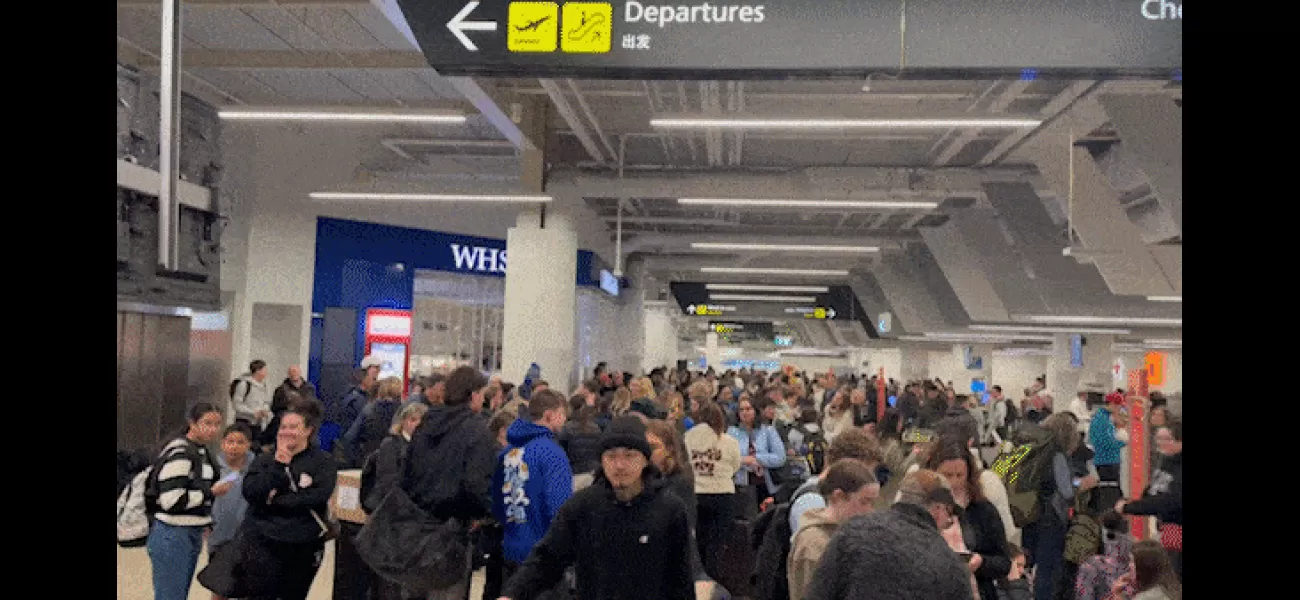Record-breaking IT failure causes global disruption.
Chaotic situations worldwide due to halted flights, disrupted banking and medical systems, and media shutdowns.
July 19th 2024.

The world was in chaos as a faulty software update caused major disruptions across the globe. Flights were grounded, banks and media outlets were offline, and services in Australia and other countries were disrupted. The update, which came from cybersecurity firm CrowdStrike, affected computers running Microsoft Windows. CrowdStrike clarified that it was not a cyberattack or hacking incident and apologized for the inconvenience, assuring that a fix was on its way. However, despite their efforts, the disruptions continued and even escalated.
The impact of the faulty update was widespread and affected various industries. At airports, long lines formed as airlines lost access to check-in and booking services, causing delays for travelers heading away on summer vacations in the northern hemisphere. Hospitals and doctors' offices also experienced problems with their appointment systems, leading to the cancellation of non-urgent surgeries. Additionally, several TV stations in the US were unable to air local news.
Among those affected were athletes and spectators traveling to Paris for the Olympic Games. German Olympic diver, Saskia Oettinghaus, was stuck at the Berlin Airport and expressed her frustration at the delay. Other athletes and spectators faced similar delays, as did their uniforms and accreditations. However, Games organizers reassured that the disruptions were limited and did not affect ticketing or the torch relay.
The aviation industry was hit the hardest, with over 3300 flights being cancelled by 1am AEST. This accounted for about 3% of the scheduled commercial flights for the day, and the number was expected to increase as the day went on. Airports around the world reported outages and delays, including Christchurch International Airport in New Zealand, Prague Airport, and Singapore's Changi airport. Some of Europe's busiest airports, such as Amsterdam Schiphol and London's Heathrow, Gatwick, Luton, and Stansted airports were also impacted.
Airlines and airports worked to implement contingency plans to minimize the impact on travelers. However, delays were still experienced at airports like Heathrow, where excessive delays were reported. The UK's rail network was also significantly impacted, with at least 14 rail operators experiencing difficulties. Dutch airline KLM was forced to suspend operations, and even after the issue was resolved, they warned of potential delays throughout the weekend. Similar disruptions were reported in India, where six airlines and Delhi airport were affected, and in Belfast, where whiteboards were brought out to serve as an improvised departures board.
Despite the chaos, some airports were able to resume operations, such as Dubai International Airport, which initially experienced issues with check-in processes but soon returned to normal. However, airlines like AirAsia and Cebu Pacific Air resorted to manual check-in processes. Hong Kong Airport was also in chaos, with manual check-ins and lengthy queues, but flights were still able to take off. In Singapore, the online flight booking service for Cathay Pacific was unavailable, and Singapore Airlines experienced technical difficulties, but the issue was eventually resolved.
Other airports, such as Suvarnabhumi Airport in Bangkok and Ninoy Aquino International Airport in Manila, also had delays and lengthy queues due to the disruptions. In Japan, Narita airport reported issues with airlines such as Jetstar and Qantas. In the US, major airlines like American Airlines, United, and Delta issued a global ground stop on all flights, but operations were eventually restored. Despite the chaos and inconvenience, airlines and airports worked to resume normal operations and minimize further disruptions.
A major issue has erupted across the globe due to a faulty software update. The update, which was provided by cybersecurity firm CrowdStrike, has caused chaos and disruptions in various industries. Banks, media outlets, hospitals, small businesses, and other services have all been affected, causing widespread turmoil. The incident has grounded flights, knocked down banks and media outlets offline, and disrupted daily operations in Australia and other countries around the world.
The problematic update was specifically targeted towards computers running on the Microsoft Windows operating system. However, CrowdStrike has clarified that it was not a hacking incident or cyberattack. They have apologized for the inconvenience caused and have assured that a fix is on the way. Despite their assurance, the disruptions continued to escalate, causing major disruptions for many hours.
The impact of this faulty update has been felt in various sectors across the globe. In Australia, long lines formed at airports as airlines lost access to check-in and booking services. This has been a major inconvenience for travelers, especially during the peak summer vacation season in the northern hemisphere. Overseas, hospitals and doctors' offices had to deal with problems in their appointment systems, resulting in the cancellation of non-urgent surgeries. Additionally, several TV stations in the US were unable to air local news on Friday.
The chaos caused by this issue has affected not just regular travelers, but also athletes and spectators on their way to the Olympic Games in Paris. Saskia Oettinghaus, a member of the German Olympic diving team, was among those stuck at the Berlin Airport. She expressed her frustration at the situation, stating that they were on their way to the Olympics but were now facing a standstill at the airport.
The disruptions caused by this faulty update have also had a major impact on the aviation industry. It has been reported that over 3300 flights have been cancelled globally, which accounts for approximately 3% of all scheduled commercial flights on Friday. This number is expected to increase as the day goes on, and the knock-on effects of the issue start to kick in.
Airports around the world have reported outages and delays, including major airports such as Christchurch International Airport, Prague Airport, and Singapore's Changi airport. Some of Europe's busiest airports, including Amsterdam Schiphol and London's Heathrow, Gatwick, Luton, and Stansted airports, have also been impacted. Passengers have experienced excessive delays, and many airlines have had to implement contingency plans to minimize the impact on journeys.
Apart from the aviation industry, the UK's rail network has also been significantly affected, with at least 14 rail operators reporting difficulties. Dutch airline KLM has been forced to suspend operations, stating that it was impossible to handle flights in the wake of the outage. Even after the airline returned to being online, they warned of delays throughout the weekend.
The impact of this issue has been felt in various countries, including India, where six airlines and Delhi airport reported disruptions. At Belfast Airport, whiteboards were used as an improvised departures board, highlighting the severity of the situation. In Edinburgh, the airport had to stop accepting incoming flights due to the chaos caused by the issue.
Although some airports have managed to resolve the issue, many others are still facing delays and disruptions. The situation has been described as "chaos" at Hong Kong Airport, where check-ins are being done manually. However, flights are still taking off. Several airlines, including AirAsia and Cebu Pacific Air, have resorted to manual check-in processes.
In the US, three major airlines, American Airlines, United, and Delta, had to issue a "global ground stop" on all their flights. However, American Airlines has since been able to resume operations safely. The impact of this issue has been felt in Japan as well, with major airlines such as Jetstar and Qantas facing issues at Narita airport near Tokyo.
This faulty software update has caused major disruptions and chaos across the globe. It has affected various industries and caused inconvenience to countless individuals. While some airports and airlines have been able to resume operations, the knock-on effects of the issue are expected to continue well into the weekend. The situation serves as a reminder of the importance of reliable and secure technology in our daily lives.
The impact of the faulty update was widespread and affected various industries. At airports, long lines formed as airlines lost access to check-in and booking services, causing delays for travelers heading away on summer vacations in the northern hemisphere. Hospitals and doctors' offices also experienced problems with their appointment systems, leading to the cancellation of non-urgent surgeries. Additionally, several TV stations in the US were unable to air local news.
Among those affected were athletes and spectators traveling to Paris for the Olympic Games. German Olympic diver, Saskia Oettinghaus, was stuck at the Berlin Airport and expressed her frustration at the delay. Other athletes and spectators faced similar delays, as did their uniforms and accreditations. However, Games organizers reassured that the disruptions were limited and did not affect ticketing or the torch relay.
The aviation industry was hit the hardest, with over 3300 flights being cancelled by 1am AEST. This accounted for about 3% of the scheduled commercial flights for the day, and the number was expected to increase as the day went on. Airports around the world reported outages and delays, including Christchurch International Airport in New Zealand, Prague Airport, and Singapore's Changi airport. Some of Europe's busiest airports, such as Amsterdam Schiphol and London's Heathrow, Gatwick, Luton, and Stansted airports were also impacted.
Airlines and airports worked to implement contingency plans to minimize the impact on travelers. However, delays were still experienced at airports like Heathrow, where excessive delays were reported. The UK's rail network was also significantly impacted, with at least 14 rail operators experiencing difficulties. Dutch airline KLM was forced to suspend operations, and even after the issue was resolved, they warned of potential delays throughout the weekend. Similar disruptions were reported in India, where six airlines and Delhi airport were affected, and in Belfast, where whiteboards were brought out to serve as an improvised departures board.
Despite the chaos, some airports were able to resume operations, such as Dubai International Airport, which initially experienced issues with check-in processes but soon returned to normal. However, airlines like AirAsia and Cebu Pacific Air resorted to manual check-in processes. Hong Kong Airport was also in chaos, with manual check-ins and lengthy queues, but flights were still able to take off. In Singapore, the online flight booking service for Cathay Pacific was unavailable, and Singapore Airlines experienced technical difficulties, but the issue was eventually resolved.
Other airports, such as Suvarnabhumi Airport in Bangkok and Ninoy Aquino International Airport in Manila, also had delays and lengthy queues due to the disruptions. In Japan, Narita airport reported issues with airlines such as Jetstar and Qantas. In the US, major airlines like American Airlines, United, and Delta issued a global ground stop on all flights, but operations were eventually restored. Despite the chaos and inconvenience, airlines and airports worked to resume normal operations and minimize further disruptions.
A major issue has erupted across the globe due to a faulty software update. The update, which was provided by cybersecurity firm CrowdStrike, has caused chaos and disruptions in various industries. Banks, media outlets, hospitals, small businesses, and other services have all been affected, causing widespread turmoil. The incident has grounded flights, knocked down banks and media outlets offline, and disrupted daily operations in Australia and other countries around the world.
The problematic update was specifically targeted towards computers running on the Microsoft Windows operating system. However, CrowdStrike has clarified that it was not a hacking incident or cyberattack. They have apologized for the inconvenience caused and have assured that a fix is on the way. Despite their assurance, the disruptions continued to escalate, causing major disruptions for many hours.
The impact of this faulty update has been felt in various sectors across the globe. In Australia, long lines formed at airports as airlines lost access to check-in and booking services. This has been a major inconvenience for travelers, especially during the peak summer vacation season in the northern hemisphere. Overseas, hospitals and doctors' offices had to deal with problems in their appointment systems, resulting in the cancellation of non-urgent surgeries. Additionally, several TV stations in the US were unable to air local news on Friday.
The chaos caused by this issue has affected not just regular travelers, but also athletes and spectators on their way to the Olympic Games in Paris. Saskia Oettinghaus, a member of the German Olympic diving team, was among those stuck at the Berlin Airport. She expressed her frustration at the situation, stating that they were on their way to the Olympics but were now facing a standstill at the airport.
The disruptions caused by this faulty update have also had a major impact on the aviation industry. It has been reported that over 3300 flights have been cancelled globally, which accounts for approximately 3% of all scheduled commercial flights on Friday. This number is expected to increase as the day goes on, and the knock-on effects of the issue start to kick in.
Airports around the world have reported outages and delays, including major airports such as Christchurch International Airport, Prague Airport, and Singapore's Changi airport. Some of Europe's busiest airports, including Amsterdam Schiphol and London's Heathrow, Gatwick, Luton, and Stansted airports, have also been impacted. Passengers have experienced excessive delays, and many airlines have had to implement contingency plans to minimize the impact on journeys.
Apart from the aviation industry, the UK's rail network has also been significantly affected, with at least 14 rail operators reporting difficulties. Dutch airline KLM has been forced to suspend operations, stating that it was impossible to handle flights in the wake of the outage. Even after the airline returned to being online, they warned of delays throughout the weekend.
The impact of this issue has been felt in various countries, including India, where six airlines and Delhi airport reported disruptions. At Belfast Airport, whiteboards were used as an improvised departures board, highlighting the severity of the situation. In Edinburgh, the airport had to stop accepting incoming flights due to the chaos caused by the issue.
Although some airports have managed to resolve the issue, many others are still facing delays and disruptions. The situation has been described as "chaos" at Hong Kong Airport, where check-ins are being done manually. However, flights are still taking off. Several airlines, including AirAsia and Cebu Pacific Air, have resorted to manual check-in processes.
In the US, three major airlines, American Airlines, United, and Delta, had to issue a "global ground stop" on all their flights. However, American Airlines has since been able to resume operations safely. The impact of this issue has been felt in Japan as well, with major airlines such as Jetstar and Qantas facing issues at Narita airport near Tokyo.
This faulty software update has caused major disruptions and chaos across the globe. It has affected various industries and caused inconvenience to countless individuals. While some airports and airlines have been able to resume operations, the knock-on effects of the issue are expected to continue well into the weekend. The situation serves as a reminder of the importance of reliable and secure technology in our daily lives.
[This article has been trending online recently and has been generated with AI. Your feed is customized.]
[Generative AI is experimental.]
0
0
Submit Comment





